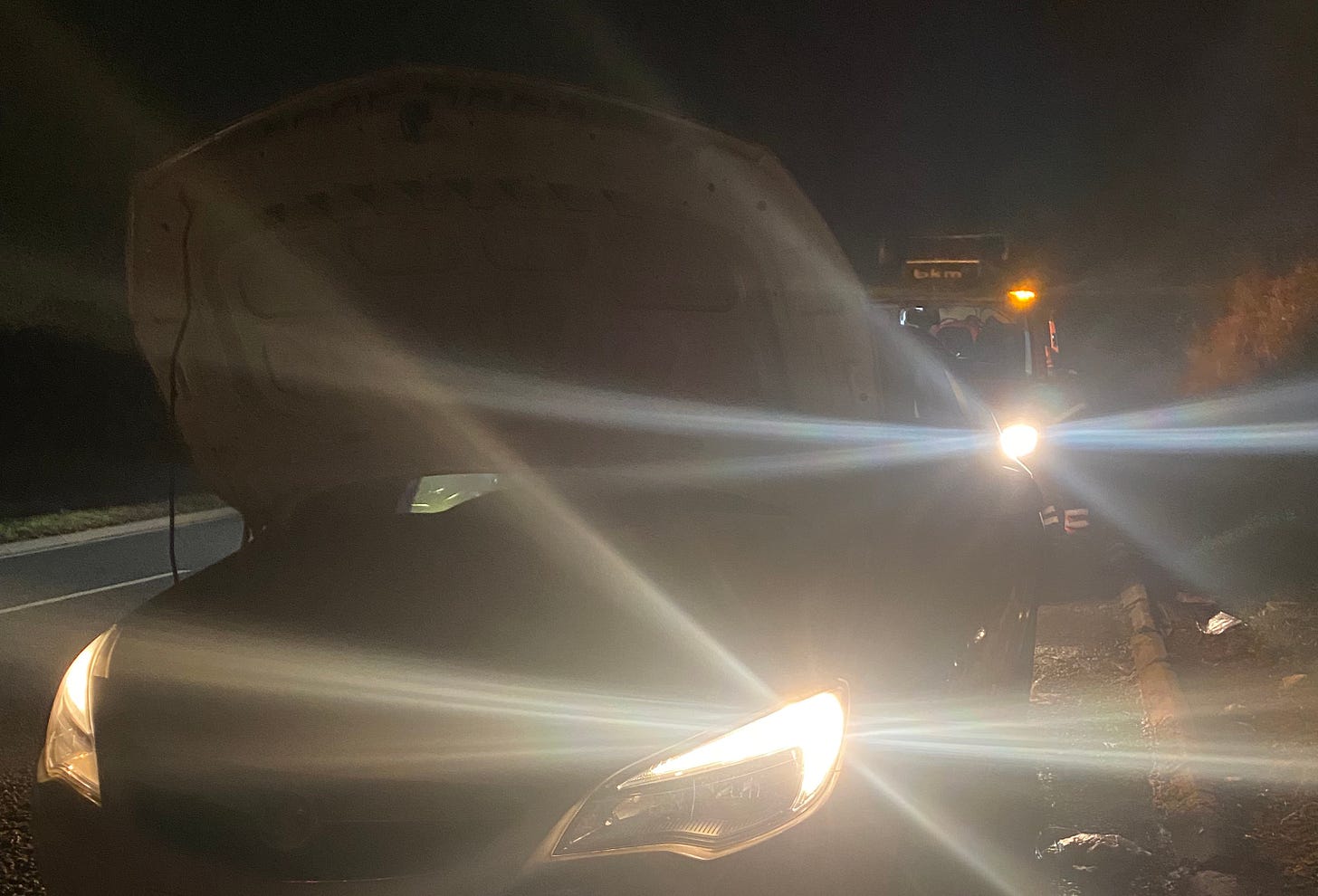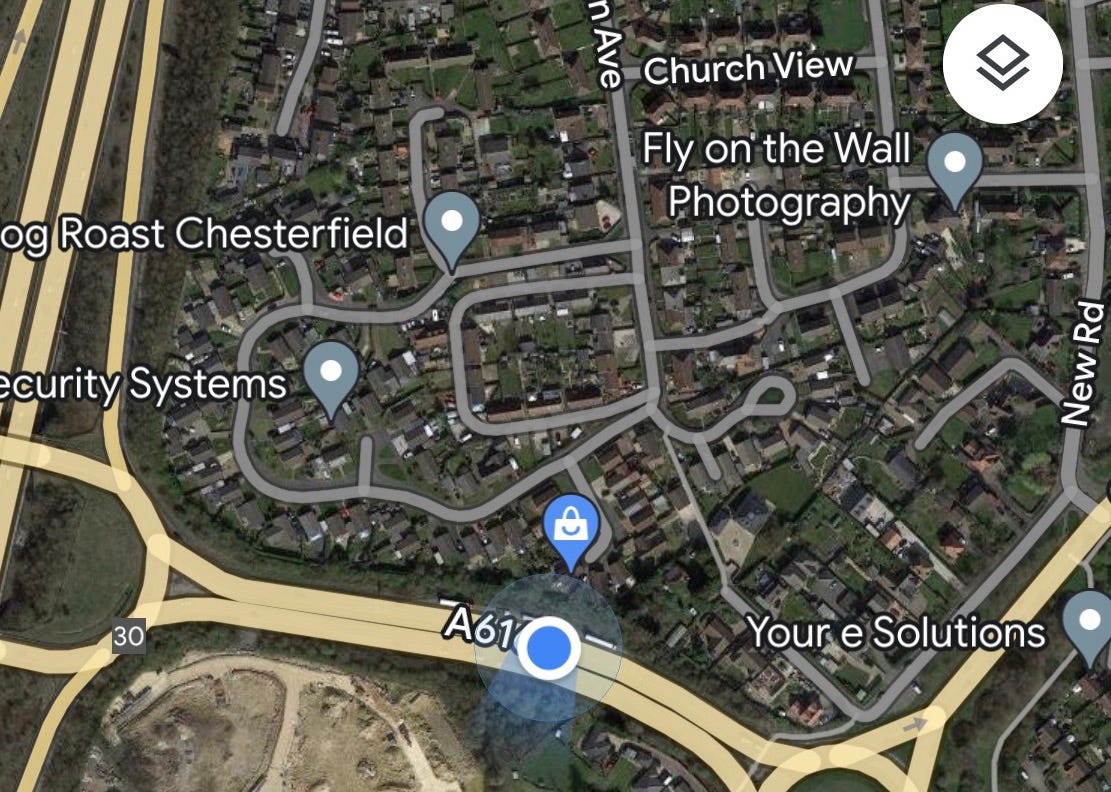It is easy to focus on the founders, but the real heroes are the maintainers

What does the above recovery truck (driven by a super-awake driver) arriving at nearly 3am have to do with the 1297 Magna Carta and the modern UK Parliamentary website? Well…
Let me start with a tiny snippet of my own personal past. My father worked at British Airways for 34 years doing mostly Boeing 747 major maintenance at their Heathrow engineering base. He worked shifts, and would often come home smelling of kerosene and Swarfega. Whenever you told anyone that your father worked for BA, the first reaction was usually to ask if he was a pilot. That’s a glamorous job. My response was to say he was an engineer, which is technically true (needing a license to do such safety critical work). That was usually as far as the conversation went.
My own birth certificate has “aircraft fitter” as his occupation, if I recall correctly, which is decidedly unglamorous. That’s closer to the person who changes the oil, tyres, and brake pads on your car, just jazzed up for aluminium tubes in the sky. Whenever there was a crash on TV, there would be a moment of nervousness until it was clear that the loss was not one of his planes. When we sojourned on free staff travel (a self-catering holiday in Barbados was cheaper in August than camping in Cornwall) he would know every noise the plane made throughout its flight cycle.
We even once flew through a tropical storm on the way home from vacation, and it was severe enough to put a crack in the skin of one wing. We had a full emergency landing at Heathrow, and there was even press to greet us after the baggage reclaim to capture the story. My own father had to go into work the next day, somewhat jet lagged, and the repair job he was allocated happened to be the aircraft we had flown on. The pay was not great, the responsibility and endless exams were onerous, and the working conditions often stressful. But it was dignified, so as a boy my own father was someone I looked up to, as he was doing heroic work in my eyes.

Last week I was heading down from visiting freedom-loving friends in the far north of Scotland. A growling sound started to emanate from the rear axle of my car, which had recently had a bearing replaced. I phoned my garage, and they advised I drive no further until it had been sorted out. So I abandoned my car with a friend, and borrowed hers, as she is temporarily unable to drive due to injury. Then coming down the M1 motorway in central England the cabin heating stopped working, and a “low coolant” message appeared.
I vowed to myself to get off the motorway at the next service station. Soon after, I found myself in a truly dire situation. The engine had suddenly gone to “red line” on the temperature gauge, overheating warning “bong” noises were made, smoke seemed to be billowing behind me in the dark, and there was no power. This was at 70mph on a four-lane freeway, with only occasional emergency pull-over places, and during rush hour. My hazy memory is of struggling to find the hazard warning light button, getting into the left lane in time, then drifting past the countdown signs to the stop.
600 yards.
400 yards.
200 yards.
Phew, I had made it — as being halted in the active highway would have been a life-threatening emergency. My heart raced and the adrenaline pumped. A small drama then ensued with trying to decode the utterances of the RAC rescue call centre lady, whose first language seemed to be Chinese, while traffic roared past, and their text messages (with URLs to click to locate me) led to nowhere. Eventually a very helpful gentleman, Darren, arrived in his rescue truck, and put me on lookout duty to see if any errant driver was in danger of rear-ending us both.

It is always poor taste to laud your own generosity, but I will make an exception in this case for the sake of narrative support. Darren had really poured his heart into making a good temporary repair to the blown hose from the coolant system, so I could complete the last 100 miles of the journey before taking the car to a garage for a permanent resolution. So after I had paid his employer for the materials used in the job, I gave him a £20 note as personal thanks for his genuine care, as other people look after me well.
“Are you really sure?”, he asked.
“Of course!”, I responded.
I knew where this hesitance of acceptance came from. My father didn’t get a single tip or bonus in 14 years in the Royal Navy, nor his decades working for an airline. The only special benefit was free staff travel that would occasionally leave you stranded at airports for days due to lack of excess seating capacity. Darren seemed delighted, as I knew that those who maintain are under-appreciated, and rescuers are doing dirty work at unsociable hours in all weathers. He urged me to let him know how it all went, as he would be thinking of the job the next day.

Alas, another 30 miles on and the engine temperature again went askew (this time in the other direction), and the low coolant warning was back, so I immediately pulled over to the hard shoulder and called for a rescue truck to take me the final 70 miles. By this time it was midnight, so it involved an initial pick-up from the motorway to get me to a local depot, then a longer leg to my destination. The very professional Lee, who is a specialist in heavy goods vehicle recovery, did the initial leg.
According to Lee, electric cars are hard work when it comes to breakdowns. Their wheels lock up, they are prone to fires, and their electronic systems are impenetrable and unrepairable. He also educated me on how this was low-paid work, done to demanding schedules for bulk contract demand like the police. It is also apparent to me that this line of work is done by natives, being unsuitable to low-cost imported cheap labour. It is too skilled, with a need for intimate knowledge of the physical and cultural terrain.

The final leg was done with Freddy, who was already fully educated on pretty much every aspect of the corrupt society we live in. He himself had endured five years of homelessness, but seemed content with his present life of doing minimum wage work in the middle of the night. Apparently being a recovery driver is the second most dangerous job in Britain. I didn’t ask what the most dangerous one is! It was if I had called for Roadside Philosophy and the erudite person who had come happened to have a side-gig as a recovery driver.
As a political dissident, I can empathise with having to deal with the “collapsed sewers” of society, albeit from the relative comfort of a laptop keyboard. Freddy had an extraordinary capacity to unlearn, relearn, and adapt. His open-minded and intelligent inquiry into the world, as well as his breadth of knowledge, leaves most of my “educated” peers and friends far behind. Ironically, I was heading to an anniversary dinner of a university club I had run… it also being 34 years this year since I began my degree. Due to my sudden loss of transport and sleep, I had to abandon that treat.

The tale of Darren, Lee, and Freddy — with three breakdowns in two cars in one day — is a rather long set-up to make my main point. It is easy to celebrate the people who design, market, and engineer. Their pioneering spirit results in national awards, celebratory statues, and commemorative plaques. Yet ultimately, the quality of society we live in depends on our ability to maintain what has been created by the builders, and this is often a grubby and poorly rewarded activity, as my father will attest.
Above is a screenshot from an active record of the statue law passed 726 years ago, which reflects the text of the earlier (and arguably superior in law) 1215 Magna Carta. This is the foundation of our constitutional rule of law, upon which all else is built. It reserves the power of punishment to the people, which acts as a dampener on the plans of tyrants to use legislation to subdue, rob, or enslave us. It also prevents the state from taking our innate rights and selling them back to us, as well as forbidding the sale of justice. It is as much law today as any legislation passed last year. Yet it is being ignored, because we (the people) are not maintaining our constitutional rights.
We now have rigged and one-sided administrative courts that lack any legal authority to act. They routinely pass out fines and and forfeits without any judicial process whatsoever, let alone a jury of one’s peers. I personally have been asked for £20 from a court to see a record that may contain an allusion to the possibility that there might be an order against me; that is unlawful. It is routine for the state to license your innate rights back to you (e.g. to travel freely in a horseless carriage, or work in particular occupations). Statutes like the Coronavirus Act 2020 are filled with unlawful threats that are used to intimidate, but never enforced.

The victims are ordinary people like Darren, Lee, and Freddy who are in the weakest position to resist “legalised predation” by the ruling class. In the case of Freddy, the juxtaposition of one of the most socially and politically savvy people I have met being in one of the worst jobs is not lost on me. We have a very big maintenance problem, and a seeming inversion of society where the most parasitical activities are rewarded best, and the most hardworking get the least.
I recently wrote to the UK Parliament asking who was responsible for the maintenance of their website and approval of its text, since it seems to make an over-claim of power and sovereignty at the expense of the people. I have received back a long cut-and-paste response on the topic of Parliamentary Sovereignty, as if to dismiss my request as ignorant and frivolous, yet no answer as to which living man or woman is accountable for the words being presented as fact. At least their hubris is congruent across all contexts. It is on you and me to be intolerant of it, and push back.
Liberty is something that is eroded and corroded; it rarely is lost in one giant systemic failure. Institutions are infiltrated, trust mark symbols are captured, and good intentions are hijacked. How the professional entitled class treat Darren, Lee, and Freddy is directly correlated to how I am treated by Parliament when I ask about my rights. The societal edifice is now out of coolant and limping along. The only resolution I see is a vast cultural change where maintenance is taught as an adult obligation and civic duty.
For the true price of freedom is not merely eternal vigilance, but ongoing maintenance — and care for the maintainers.
 Read It Now
Read It Now